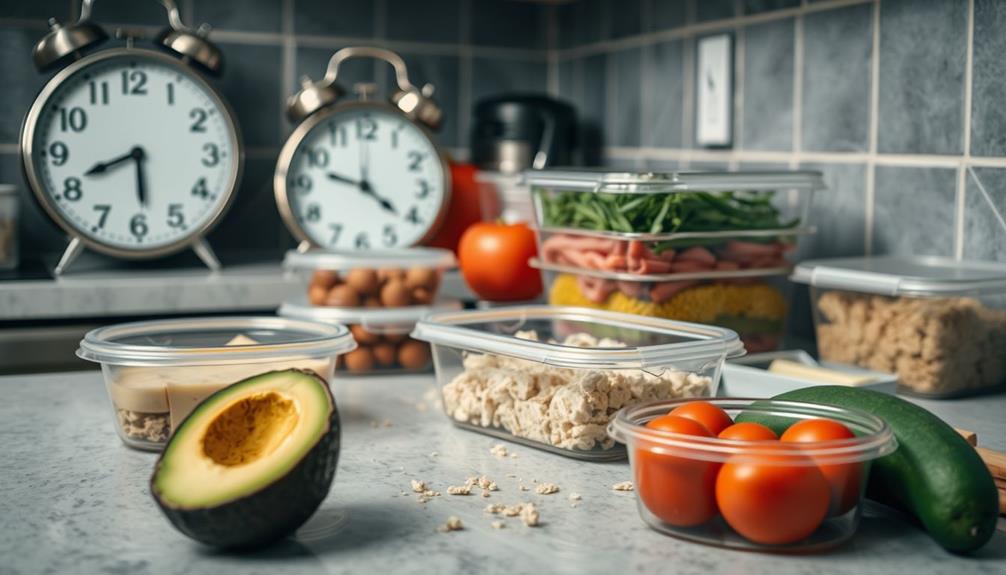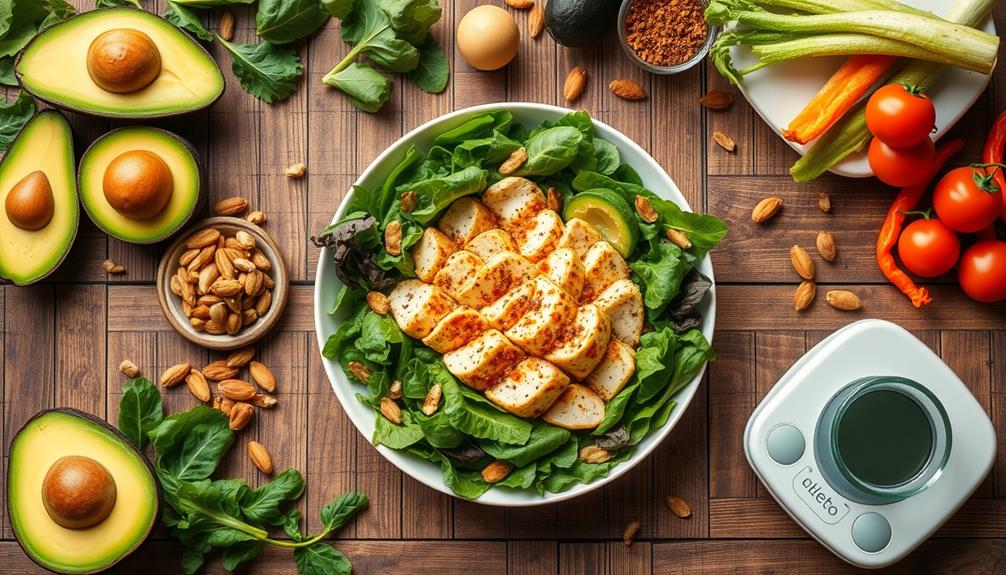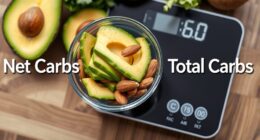To succeed on the keto diet, watch out for common pitfalls that could derail your progress. Insufficient healthy fats can leave you feeling drained, so make sure they're a major part of your diet. Be cautious of hidden carbs in processed foods—check labels carefully. Don't neglect your electrolytes and hydration; both are essential for energy and overall health. A lack of nutrient diversity can lead to deficiencies, so mix in various low-carb veggies and healthy fats. Finally, track your macros to avoid overloading on carbs. Keep these in mind, and you'll uncover even more tips to boost your keto journey!
Key Takeaways
- Prioritize healthy fats to make up 70-75% of your calorie intake for sustained energy and effective ketosis.
- Read labels carefully to avoid hidden carbs in processed foods, sauces, and snacks.
- Maintain electrolyte balance with foods rich in sodium, potassium, and magnesium to prevent fatigue and cramps.
- Stay adequately hydrated by drinking 8-10 cups of water daily, especially during the initial keto phases.
- Track macronutrients diligently to avoid unintended carb overload and ensure adherence to your keto goals.
Insufficient Healthy Fats

One of the biggest pitfalls on the keto diet isn't consuming enough healthy fats. You might think cutting down on fats will help you lose weight, but that's not the case here.
Healthy fats, like avocados, olive oil, and fatty fish, should make up about 70-75% of your total calorie intake. When you don't eat enough, you risk low energy levels and might even stall your weight loss progress.
Plus, insufficient fats can lead to nutritional imbalances that can affect your overall health. To stay on track, prioritize incorporating a variety of healthy fats into your meals.
This approach not only fuels your body but also helps you maintain ketosis and enjoy the benefits of the keto lifestyle effectively.
Hidden Carbs in Foods

Many people underestimate the impact of hidden carbs in foods, which can easily sabotage your keto efforts. You might think you're sticking to your carb limit, but processed snacks, sauces, and even some "healthy" foods often contain unexpected sugars and starches.
Always read labels carefully; ingredients like maltodextrin, dextrose, and certain preservatives can add up quickly. Even seemingly innocent items like salad dressings or granola can be packed with carbs.
Stick to whole, unprocessed foods whenever possible, and opt for homemade sauces to control ingredients. When dining out, don't hesitate to ask about ingredients or preparation methods.
Neglecting Electrolyte Balance

While you might focus on macronutrients when following a keto diet, neglecting your electrolyte balance can lead to significant health issues. Key electrolytes like sodium, potassium, and magnesium are vital for your body's function, especially when you're cutting carbs.
Maintaining a balanced diet rich in these nutrients is essential for overall health, as highlighted in lifestyle for longevity. Without enough of these nutrients, you could experience fatigue, headaches, and muscle cramps.
To maintain balance, incorporate electrolyte-rich foods such as leafy greens, avocados, and nuts into your meals. You might also consider supplements if your dietary intake falls short.
Pay attention to your body; symptoms like dizziness or irritability often signal an electrolyte imbalance. By prioritizing your electrolyte intake, you'll support your overall health and enhance your keto diet success.
Don't overlook this essential aspect!
Inadequate Hydration

Proper hydration is essential when you're on a keto diet, especially during the initial phases as your body adjusts to ketosis. When you reduce carbs, your body releases stored water, making it important to replenish fluids.
Aim for 8-10 cups of water daily, adjusting based on your activity level. Inadequate hydration can worsen keto flu symptoms like fatigue and headaches.
Keep an eye on your urine color; a light yellow indicates good hydration. If you notice darker urine, it's time to drink more.
Don't forget about electrolytes, too; they play a critical role in maintaining hydration and overall well-being. So, prioritize drinking enough water and consider electrolyte-rich foods to support your shift into ketosis.
Lack of Nutrient Diversity

A well-rounded keto diet isn't just about cutting carbs; it's also essential to include a variety of nutrient-dense foods. Without nutrient diversity, you risk deficiencies in essential vitamins and minerals that can impact your health.
Relying solely on a limited range of foods, like meats and fats, mightn't provide the nutrients your body needs for peak function. To avoid this pitfall, incorporate a range of non-starchy vegetables, nuts, seeds, and low-carb fruits into your meals.
These foods not only enhance your nutrient intake but also add flavor and variety to your diet. Remember, a diverse diet supports overall well-being and helps you maintain energy levels and health throughout your keto journey.
Don't underestimate the power of variety!
Ignoring Macronutrient Tracking

Nutrient diversity plays a significant role in the success of your keto journey, but it's equally important to keep a close eye on your macronutrient intake.
Ignoring macronutrient tracking can lead to unintended carb overload, which derails your ketosis goals. You should aim for approximately 70-75% of your calories from healthy fats, moderate protein to support muscle retention, and limit carbs to under 50 grams daily.
Without tracking, you mightn't realize how quickly those carbs add up, especially from hidden sources in processed foods. Regularly monitoring your macros guarantees you're not just following the keto diet but doing it effectively.
Embrace this practice to stay on track and achieve your weight loss and health objectives.
Overlooking Nutritional Supplements

Many keto dieters underestimate the importance of nutritional supplements in their meal plans. Skipping these can lead to nutrient deficiencies that hinder your progress. Consider incorporating supplements to support your health and enhance your keto journey. Here's a quick reference for key supplements:
| Supplement | Benefits | Food Sources |
|---|---|---|
| Electrolytes | Balance fluids, reduce cramps | Leafy greens, nuts |
| MCT Oil | Boost energy, improve focus | Coconut oil, palm kernel |
| Omega-3 Fatty Acids | Support heart health | Fatty fish, flaxseeds |
| Vitamin D | Improve mood, bone health | Sunlight, fortified foods |
Skipping Meal Prep

Skipping meal prep can greatly undermine your success on the keto diet. When you don't plan ahead, you risk making poor food choices that can derail your progress.
Here are four reasons to prioritize meal prep:
- Prevents Temptation: Having meals ready reduces the chance of grabbing high-carb snacks.
- Saves Time: Batch cooking lets you enjoy quick, ready-to-eat meals throughout the week.
- Controls Portions: Pre-portioned meals help you stick to your macronutrient goals.
- Enhances Variety: Planning allows you to incorporate a diverse range of keto-friendly foods, preventing boredom.
Frequently Asked Questions
Can I Consume Dairy Products on a Keto Diet?
Yes, you can consume dairy products on a keto diet. Choose high-fat options like cheese, cream, and butter while avoiding sugary varieties. Be mindful of portion sizes to maintain your carb limits and stay in ketosis.
Are There Keto-Friendly Snacks I Can Enjoy?
Imagine munching on a delicious cheese platter at a fancy soirée! You can enjoy keto-friendly snacks like cheese, nuts, avocados, and low-carb veggies. Just watch portions to keep your carbs in check and stay in ketosis.
How Can I Tell if I'm in Ketosis?
You can tell you're in ketosis by monitoring your body for symptoms like increased energy, reduced hunger, and bad breath. Testing ketone levels with strips or blood meters provides a more precise indication of ketosis.
Is Intermittent Fasting Compatible With the Keto Diet?
Yes, intermittent fasting's compatible with the keto diet. It can enhance fat-burning and help you achieve ketosis faster. Just guarantee you maintain your macronutrient balance during eating windows to support energy and overall health.
What Are the Benefits of MCT Oil on Keto?
MCT oil's like a secret weapon for your keto journey. It boosts energy, fuels ketosis quickly, and may enhance mental clarity. You'll feel more focused and energized, making your keto experience truly rewarding.
Conclusion
As you navigate the twists and turns of the Keto diet, keep a watchful eye on those lurking pitfalls. Picture yourself standing at a crossroads, where one path leads to vibrant health and the other to fatigue and frustration. By avoiding insufficient fats, hidden carbs, and hydration neglect, you're not just dodging obstacles—you're paving the way to success. Embrace your journey with knowledge and vigilance, and let the rewards of Keto unfold before you like a treasure map waiting to be explored.









